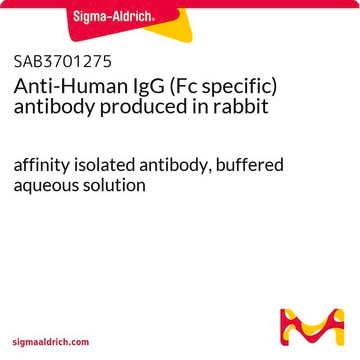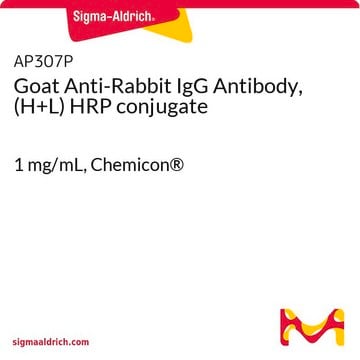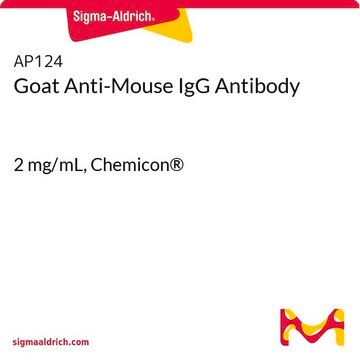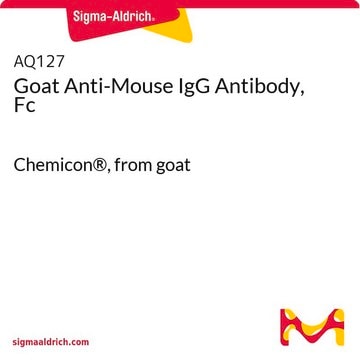AP127
Goat Anti-Mouse IgG Antibody, Fc
2.4 mg/mL, Chemicon®
Bejelentkezésa Szervezeti és Szerződéses árazás megtekintéséhez
Összes fotó(1)
About This Item
UNSPSC kód:
12352203
eCl@ss:
32160702
NACRES:
NA.46
Javasolt termékek
biológiai forrás
goat
Minőségi szint
konjugátum
unconjugated
antitest forma
affinity purified immunoglobulin
klón
polyclonal
faj reaktivitás
mouse
gyártó/kereskedő neve
Chemicon®
koncentráció
2.4 mg/mL
technika/technikák
ELISA: suitable
immunoprecipitation (IP): suitable
western blot: suitable
kiszállítva
wet ice
célzott transzláció utáni módosítás
unmodified
Általános leírás
Immunoglobulin G (IgG), is one of the most abundant proteins in human serum with normal levels between 8-17 mg/mL in adult blood. IgG is important for our defence against microorganisms and the molecules are produced by B lymphocytes as a part of our adaptive immune response. The IgG molecule has two separate functions; to bind to the pathogen that elicited the response and to recruit other cells and molecules to destroy the antigen. The variability of the IgG pool is generated by somatic recombination and the number of specificities in an individual at a given time point is estimated to be 1011 variants.
Alkalmazás
Detect Mouse IgG using this Goat anti-Mouse IgG Antibody, Fc validated for use in ELISA, IP & WB.
Fizikai forma
Affinity purified immunoglobulin. Liquid. Buffer = 0.01% Sodium Phosphate, 0.25 M NaCl, pH 7.6
Tárolás és stabilitás
Store at +2-8°C in undiluted aliquots for up to six months, sterile conditions.
Jogi információk
CHEMICON is a registered trademark of Merck KGaA, Darmstadt, Germany
Tárolási osztály kódja
12 - Non Combustible Liquids
WGK
WGK 2
Lobbanási pont (F)
Not applicable
Lobbanási pont (C)
Not applicable
Analitikai tanúsítványok (COA)
Analitikai tanúsítványok (COA) keresése a termék sarzs-/tételszámának megadásával. A sarzs- és tételszámok a termék címkéjén találhatók, a „Lot” vagy „Batch” szavak után.
Már rendelkezik ezzel a termékkel?
Az Ön által nemrégiben megvásárolt termékekre vonatkozó dokumentumokat a Dokumentumtárban találja.
Different rates of glycolysis affect glycolytic activities and protein properties in turkey breast muscle.
S Eadmusik,C Molette,H Remignon,X Fernandez
Animal : An International Journal of Animal Bioscience null
Miles C Scotcher et al.
Monoclonal antibodies in immunodiagnosis and immunotherapy, 32(1), 6-15 (2013-04-23)
Botulinum neurotoxins (BoNT) are produced by Clostridium botulinum and cause severe neuroparalytic disease that if not treated quickly is often fatal. The toxin is produced as a 150 kDa precursor protein (holotoxin) that is enzymatically cleaved to form two subunits, heavy
Miles C Scotcher et al.
PloS one, 5(6), e11047-e11047 (2010-06-16)
Botulinum neurotoxin (BoNT), the causative agent of botulism, a serious neuroparylatic disease, is produced by the anaerobic bacterium Clostridium botulinum and consists of a family of seven serotypes (A-H). We previously reported production of high-affinity monoclonal antibodies to BoNT serotype
Larry H Stanker et al.
Journal of immunology (Baltimore, Md. : 1950), 185(1), 729-737 (2010-06-10)
Prion diseases are fatal, neurodegenerative illnesses caused by the accumulation of PrP(Sc), an aberrantly folded isoform of the normal, cellular prion protein. Detection of PrP(Sc) commonly relies on immunochemical methods, a strategy hampered by the lack of Abs specific for
Sarwish Rafiq et al.
Nature biotechnology, 36(9), 847-856 (2018-08-14)
The efficacy of chimeric antigen receptor (CAR) T cell therapy against poorly responding tumors can be enhanced by administering the cells in combination with immune checkpoint blockade inhibitors. Alternatively, the CAR construct has been engineered to coexpress factors that boost
Tudóscsoportunk valamennyi kutatási területen rendelkezik tapasztalattal, beleértve az élettudományt, az anyagtudományt, a kémiai szintézist, a kromatográfiát, az analitikát és még sok más területet.
Lépjen kapcsolatba a szaktanácsadással








